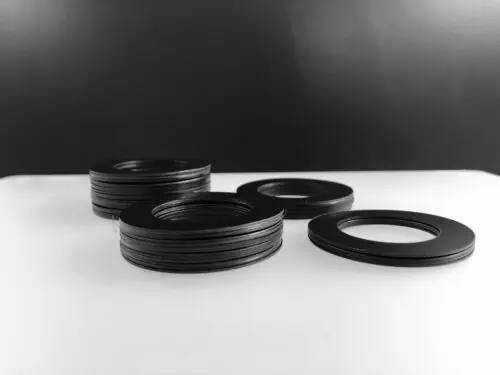Nylon spacers are a critical yet often overlooked component across diverse industries. Used to lengthen the space between connected parts, nylon spacers function as glides, bearings, bushings, and rollers. The highly durable features of nylon make these spacers resistant to cracks and corrosion, ideal for insulating against moisture and electricity. As a result, nylon spacers can be used across many outdoor and indoor applications in the electronics, construction, automotive, and other industries.
Learn more about nylon spacers, including their benefits in various applications.
What Are Nylon Spacers?
Nylon spacers are tubular components that create and maintain space between fastened parts. They ensure that each part is properly positioned or aligned within its assembly. Nylon is a versatile synthetic material that is strong, durable, non-flammable, chemical-resistant, non-toxic, and weather-resistant. These properties, along with the lightweight and non-conductive nature of nylon spacers, make them ideal for indoor and outdoor use across a variety of applications.
Applications of Nylon Spacers
Nylon spacers are used to create a specific distance between two objects. They also provide additional functions such as thermal insulation, electrical isolation, noise and vibration reduction, and supporting weight and pressure.
The lightweight and corrosion-resistant properties of nylon spacers make them useful for a variety of industries, including:
- Construction
- Manufacturing
- Security
- Electronics
- Electrical
- Automotive
- Marine
- Military
- HVAC
Advantages of Using Nylon Spacers
Metal spacers made of brass, aluminum, or steel are common alternatives to nylon spacers. However, nylon spacers are preferable in many applications, due to the following distinct advantages:
- Corrosion resistance: Since nylon doesn’t corrode like metal, it’s likely to last longer in marine and outdoor environments.
- Lightweight: Nylon spacers have an excellent strength-to-weight ratio, which allows them to be used in weight-sensitive applications.
- Chemical resistance: Compared to metals, nylon is more resistant to certain chemicals, including acids, alkalis, and organic solvents.
- Resistance to UV radiation: Nylon spacers are generally more resistant to damage from sunlight and UV radiation than metal spacers.
- Versatility: Nylon can easily be molded into various shapes and sizes, making it ideal for customization.
- Electrical insulation: Nylon’s non-conductive properties prevent the unwanted transfer of electricity between components.
- Low cost: Nylon spacers are usually less expensive than metal spacers.
- Temperature: Nylon has characteristics to protect against extreme temperatures- both hot and cold.
Custom Nylon Spacers from New Process Fibre
Nylon spacers are crucial for the precise positioning of components in machinery and assemblies in many industries. Their strength, resistance to chemicals and moisture, and electrical insulation properties make them ideal for use in many environments where metal isn’t a feasible option.
All nylon products from New Process Fibre meet LP-410 Standards, ensuring our spacers deliver the quality necessary to meet your project requirements, whether you need custom spacers, gaskets, washers, insulators, or other shapes. We’ve been meeting the needs of our customers with custom fabrication solutions since 1927.
With state-of-the-art tooling and a wealth of experience, New Process Fibre produces a variety of custom nylon parts to serve a wide range of industrial applications. Contact us for more information about our custom nylon spacer capabilities.


